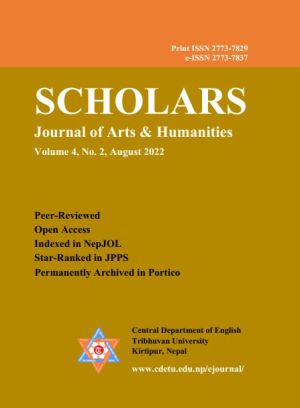Redefining the Other: Sexual Politics in Ismat Chughtai’s “The Mole” and “The Homemaker”
DOI:
https://doi.org/10.3126/sjah.v4i2.47427Keywords:
Subject, Other, sexuality, sexual politicsAbstract
In presenting the sexual politics in her stories, Ismat Chughtai is often quite deconstructive. In her stories, “The Mole” and “The Homemaker,” she breaks the traditional power nexus of man as the subject and woman as the Other in the politics of sexuality by presenting the characters of Rani and Lajo respectively. These characters, with their bold and authoritative sexuality, choose their sexual relationships on their own and posit themselves at the centre of those relationships—Rani in her relationships with Choudhry, Chunnan and Ratna; and Lajo in hers with Mirza. By portraying these two women as the subject in their sexual politics, Chughtai redefines the Other to be the man, instead of the woman. The pattern that Chughtai weaves here to do that has two distinct threads: first, empowering both Rani and Lajo with their sexuality and second, making them reciprocal in the sexual politics they share with the men in the stories. Drawing on the theoretical perspective from Simone de Beauvoir’s The Second Sex, this paper examines Chughtai’s process of redefining the Other in the sexual politics between the men and the women in her stories. The study demonstrates that the author has redefined the Other to be the men in the stories when it comes to the question of a reciprocal sexual politics and thus she has contributed to the gynocentric Urdu narratives by manifesting an intellectual rebellion against the phallocentric notions of her time.
Downloads
Downloads
Published
How to Cite
Issue
Section
License
Copyright (c) 2022 Central Department of English, Tribhuvan University and Authors

This work is licensed under a Creative Commons Attribution 4.0 International License.
© Central Department of English, Tribhuvan University and Authors




